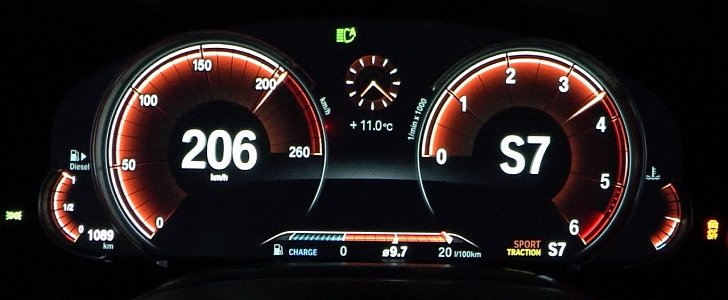That's right; BMW has finally begun making the all-new 750d model, which is its first to receive a quad turbocharged 3-liter engine.
Eventually, this mill will replace the one in the M550d twins and the X5/X6 M50d. However, that won't happen until the all-new 5 Series makes its debut later this month or 2018 in the case of the SUVs.
The output itself won't blow your mind: 400 PS and 760 NM of torque. Especially in the twisting force department, the Audi SQ7's 4.0 TDI with its electric supercharger has BMW beaten. However, that's a V8 and this is a 3-liter inline-6.
We have no idea why you would need that much power in a 7 Series or if four turbochargers really can help to save fuel. But as far as bragging rights are concerned, the 750d should have all the attention in the top banking management's parking lot.
We're going to show you two videos of the same thing, just because we can. However, both suggest the claimed 0 to 100 km/h time of 4.6 seconds is legitimate. Increasing the output by 19 PS over the tri-turbo predecessor has shaved 0.3 of a second of the sprint time.
However, even the basic 730d with just one turbine takes 5.8 seconds to reach the benchmark speed, which we think is good enough. But if you are drunk on speed and power, there is the 760Li version.
Anyway, BMW made a host of changes to the 3-liter engine that ensure it's also more efficient. These include increased fuel injection pressure, a slippery twin-wire-arc-sprayed cylinder bore coating and centrally controlled cooling. There are also two separate exhaust gas recirculation systems, one for low-pressure boost and one when the two larger turbos are active.
According to BMW, the new 750d is 11% more efficient, achieving 5.7 l/100km on the combined European test cycle. All that so that you can have power in a 7 Series? No, it's more of a way for BMW to flex its engineering muscles.
The output itself won't blow your mind: 400 PS and 760 NM of torque. Especially in the twisting force department, the Audi SQ7's 4.0 TDI with its electric supercharger has BMW beaten. However, that's a V8 and this is a 3-liter inline-6.
We have no idea why you would need that much power in a 7 Series or if four turbochargers really can help to save fuel. But as far as bragging rights are concerned, the 750d should have all the attention in the top banking management's parking lot.
We're going to show you two videos of the same thing, just because we can. However, both suggest the claimed 0 to 100 km/h time of 4.6 seconds is legitimate. Increasing the output by 19 PS over the tri-turbo predecessor has shaved 0.3 of a second of the sprint time.
However, even the basic 730d with just one turbine takes 5.8 seconds to reach the benchmark speed, which we think is good enough. But if you are drunk on speed and power, there is the 760Li version.
Anyway, BMW made a host of changes to the 3-liter engine that ensure it's also more efficient. These include increased fuel injection pressure, a slippery twin-wire-arc-sprayed cylinder bore coating and centrally controlled cooling. There are also two separate exhaust gas recirculation systems, one for low-pressure boost and one when the two larger turbos are active.
According to BMW, the new 750d is 11% more efficient, achieving 5.7 l/100km on the combined European test cycle. All that so that you can have power in a 7 Series? No, it's more of a way for BMW to flex its engineering muscles.







